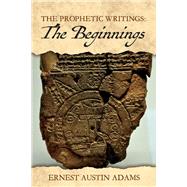The Beginnings
, by Adams, Ernest Austin- ISBN: 9781543977103 | 1543977103
- Cover: Paperback
- Copyright: 10/6/2019
It was found that Ezra claimed that the Torah was burned during the destruction of Jerusalem, c., 597 BC, and he saw the need to rewrite their foundation documents to show what God purportedly did from the beginning (2 Esdras 14:19-22). At this time, the Israelites were in captivity in Babylon with the threat of losing their national identity and decided to rewrite their foundation documents with a survivalist agenda to ensure their posterity. Evidence shows that they not only rewrote what appeared in their prior writings but revised their history to include additions which would give them their best chance of surviving as a nation. Startling research findings include;•The Jewish priests adopted the motif of having God speak in the first person as was the custom with religious writings in the Levant and Mesopotamia at that time. •That the Biblical creation account of the heavens, plants, fish, birds and animals were based on earlier Sumerian and Babylonian mythological accounts and shows precisely on which myths these were styled.•The creation of the first man Adam was also styled on various Sumerian and Babylonian myths including the garden of the gods, a tree of the gods and how man sinned and was excommunicated from the presence of God.•That the alleged Biblical universal flood story with Noah as the main character was derived from prior Sumerian myths which portrayed a flood hero who built an Ark to save a small group of people. •The genealogy from Adam to Noah was based on the mythological Sumerian Antediluvian King Lists. In their endeavor to show how these countries were allegedly founded after the flood, it is detailed how Jewish priests used the names of existing lands in their known world to name Noah's purported family members. It is shown clearly that the names of these countries were not named after Noah's supposed descendants.•The Tower of Babel and the Giants of Anak mythologies existed prior to the biblical accounts and were included by the Jewish priests in their rewritten foundation documents as perceived world history. •There was never a person named Cain who lived before the flood, nor was there a man named Ham or his son Canaan who lived after the flood, all of whom were purportedly cursed, either by Noah or God. It was found that the motive for the curses pronounced over Cain, Ham and Canaan was in retaliation against the Canaanites who had become their enemies, and they wanted to remove them by genocide from "their land" Canaan, purportedly at the behest of God. Their curse on Ham was directed at the Egyptians who failed to support the Israelites against the Babylonians as arranged.•It is mentioned in excess of forty times in their foundation documents that the land of Canaan was promised to the Israelites and that God would purportedly drive the inhabitants of Canaan out of their land, showing that this was the focus of the rewrite of their foundation documents.•Research shows that there were no spectacular events precipitating the departure of the Israelites from Egypt. The Egyptians could not forcibly oust them or the other Amoritic settlers from Avaris, so they encouraged their removal from Egypt by compensating them for their houses and land, and they left Avaris unimpeded for Mt. Horeb in Arabia. The Egyptians saw them as a political threat and blamed the foreigners, i.e., the "Shemmo", for bringing the black plague to Egypt through their trading ships at Avaris, which was killing all and sundry.•Research shows that there was no Tabernacle in the Wilderness and that this was styled on their Temple at the time of the sacking of Jerusalem, c., 597 BC, in an attempt to show that their Temple was designed by God and that God purportedly dwelt in this Tabernacle similar to what was believed by their Babylonian captors.•The Passover Feast and the Feast of Tabernacles were only practised from the time of their Babylonian captivity and were unheard of before this time.







